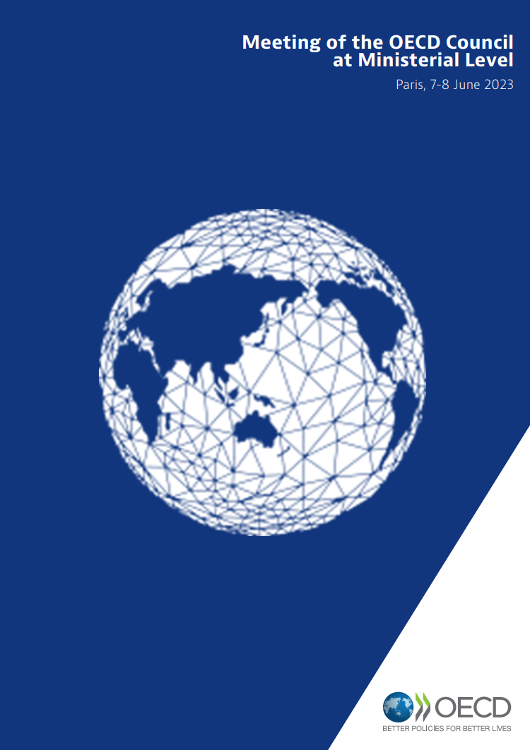Remarks by Mathias Cormann, Secretary-General, OECD
27 September 2023
President Boric Font,
Ministers, colleagues, distinguished guests,
Welcome to this 2023 Conference of the OECD Global Forum on Productivity.
Thank you to the Chilean Ministry of Foreign Affairs for hosting the conference, and the Ministry of the Economy for co-organising it with the OECD.
By hosting productive exchanges like this one, Chile is demonstrating a real commitment to improving productivity domestically, and to supporting economic dynamism in the region more broadly.
Productivity growth is one of the key engines of economic growth and the key to sustainable increases in living standards.
Productive businesses are better able to respond to changing market conditions, including leveraging technology to keep operating during shocks and disruptions.
Over the past two decades though, productivity growth has slowed across OECD economies, from 2% in the early 2000s to less than 1% before the pandemic hit.
During the same period, our economies have become more concentrated, and the disparity between leading and laggard firms has increased.
On average, the OECD estimates that the top eight firms of an industry have increased their share of industry revenues by around 8% in North America and 4% in Europe.
Job reallocation rates and the share of start-ups among firms are down by more than 20% over the past two decades – a further indication that our economies have become less dynamic.
To address these challenges, the OECD Global Forum on Productivity has supported countries in their pursuit of productivity-enhancing policies since its creation in 2015.
It does so by providing a robust evidence base and policy insights, and by organising peer learning events.
Four key areas where policymakers can improve productivity growth:
First, ensuring a predictable but flexible regulatory and institutional environment.
While regulation is necessary to safeguard public interest, overly rigid and burdensome regulations can keep inefficient firms in markets.
Governments should ease barriers to exit and improve bankruptcy frameworks.
Rigid regulation can also prevent productive and innovative start-ups from entering the market.
This has important economic implications:
OECD analysis finds that young firms create almost half of new jobs on average across OECD countries – but are often held back by barriers in accessing finance, skills, knowledge and technology.
Governments should ensure that regulations do not hamper the incentives of existing firms to innovate and adopt better technologies, and do not keep more productive firms, including new entrants, from growing.
In some cases, targeted financial support can also be effective: for example, the OECD’s analysis shows that tax credits for research and development, and direct government support to firm innovation, are effective tools to help innovative start-ups overcome financial constraints.
Second, bridging digital divides.
The overall gains of digitalisation for growth and productivity have not yet been fully realised due to enduring digital divides hampering technology adoption.
Divides between rural and urban areas – people in OECD metropolitan regions have broadband download speeds that are on average 45% faster than remote regions.
Divides among income levels, since affordability remains a major barrier to access in many countries.
Divides across businesses – with many businesses being left behind while a small number of leading firms benefit the most.
To help firms adopt new technologies, economies need further investments in skills and organisational capabilities - not only for the most productive firms but for all firms.
Recent analysis by the Global Forum on Productivity team suggests that one-third of the gap between the most productive and median firms is made up by the “human side” of productivity, in other words the skills, management, and diversity of the workforce.
Boosting this driver of productivity means ensuring a high-quality education sector that offers both vocational and advanced tertiary education.
Active labour market policies, reskilling and effective lifelong learning are key to boost productivity by addressing skill shortages – including by retaining the talents of older workers for longer.
And tackling labour market segregation between genders can improve productivity by helping to tap into the potential of women in fields where they are currently underrepresented, like science, technology, engineering and mathematics.
Third, enabling and encouraging innovation in green technologies.
With the right incentives and investments, the transition into greener economies can be an opportunity to diversify our economies and increase productivity.
New OECD research on "the green side of productivity" shows that across different industries, the firms that are most productive within their industry are those which rely most heavily on tasks involving green technologies.[x]
Governments need to use policy tools to incentivise investments in, and the adoption of, green technologies by the business sector.
This includes providing targeted support and encouraging greater private investment in green technology research, development and demonstration.
While raising these funds remains a challenge for many countries, the OECD’s recent report on climate mitigation for our Net Zero+ initiative provides practical recommendations on building a supportive environment for sustainable finance to grow.
This includes adopting responsible business conduct policies that address the risk of greenwashing in the financial sector, for example.
Some of these solutions will be discussed in depth today, in one of the afternoon sessions.
Fourth, leveraging global supply chains to increase productivity.
An open, rules-based international trading system is essential for productive and resilient economies.
Global value chains present an opportunity to drive productivity growth through access to the global market of inputs and final consumers.
International trade flows also tend to enhance investment and technology diffusion linkages between countries – supporting growth and development.
OECD analysis shows that foreign direct investments can facilitate the transfer of knowledge and technology, and ultimately increase the productivity of local suppliers.
A skilled workforce and procompetitive regulations are important ingredients for maximising the productivity benefits of global supply chain integration.
I wish you well in your discussions today and tomorrow.
Thank you.

